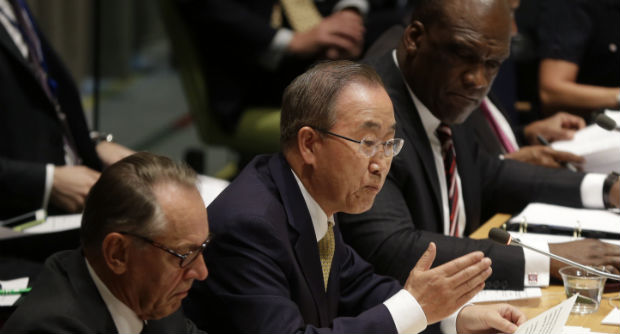UN chief: Gaza deaths, destruction shame world

United Nations Secretary-General Ban Ki-moon, center, speaks during an informal meeting of the General Assembly on the conflict in Gaza at U.N. headquarters, Wednesday, Aug. 6, 2014. AP
UNITED NATIONS — Secretary-General Ban Ki-moon demanded an end to what he called the senseless cycle of suffering in the Israeli-Palestinian conflict Wednesday, telling the General Assembly that “the massive deaths and destruction in Gaza have shocked and shamed the world.”
Ban urged the international community to support the enormous task of rebuilding Gaza, providing humanitarian aid to thousands in need and treating the wounded.
“We will build again, but this must be the last time to rebuild,” the U.N. chief told the 193-member world body. “This must stop now. They must go back to the negotiating table.”
“We must spare no effort to turn the current calm into a durable cease-fire that addresses the underlying issues of the conflict.”
He said that means ending weapons smuggling into and rocket fire from Gaza, opening its crossings, lifting Israel’s blockade and bringing the Hamas-ruled strip back under a unified Palestinian government.
Article continues after this advertisementBan also called on Hamas to honor past commitments made by Yasser Arafat’s Palestine Liberation Organization, including the right of the state of Israel to exist.
Article continues after this advertisementThe U.N.’s deputy humanitarian chief, Kyung-wha Kang, said the United Nations and its partners have appealed for $367 million to address immediate needs for over 500,000 people — more than one-quarter of Gaza’s 1.8 million population — who “fled for their lives with nothing.” She said 65,000 people who have lost everything because their homes were reduced to rubble.
Kang painted a grim picture of what she called the “utter devastation” in Gaza: 144 schools and other facilities damaged; a public health system “on the verge of collapse” with one-third of hospitals, 14 primary health care clinics and 29 ambulances damaged; more than one million people without access to water and very limited electricity; and the prevalence of unexploded ammunition.
Kang said the lack of electricity means hospitals can’t power critical machinery, food production will decrease and water and sewage can’t be pumped. Sewage back-ups could contaminate water, making the outbreak of disease “a very serious risk,” she said.
Ban said the United Nations understands Israel’s right to defend itself from Hamas rockets, but “the horror that was unleashed on the people of Gaza” raises serious questions about international law and distinguishing between civilians and combatants, and proportionality in attacks.
U.N. human rights chief Navi Pillay told the assembly that “any attacks in violation of these principles, on civilians, homes, schools and hospitals, must be condemned, and may amount to war crimes.”
She told the assembly by videoconference that the casualty toll in this conflict — nearly 1,900 Palestinians, the vast majority civilians, and 64 Israeli soldiers and three civilians — tops conflicts in 2008-2009. Kang said at least 122 Palestinian families lost three or more family members.
Pillay stressed that there has been no accountability for the conflicts in 2008-2009 and in 2012. She said the U.N. Human Rights Council’s new Commission of Inquiry will present a report in March 2015.
Israel’s U.N. Ambassador Ron Prosor said the only way to restore sustained peace in Israel and Gaza is to disarm Hamas and demilitarize Gaza. “And the international community must divorce itself from the romantic notion of Hamas as ‘freedom fighters,'” he said.
Riyad Mansour, the Palestinian U.N. ambassador, accused Israel of “savagery.” He said the Palestinians seek both a durable cease-fire and an end to the Israeli blockade “which has suffocated and disfigured life in Gaza for the past eight years.”
Arab nations asked for the informal General Assembly meeting on Gaza and more than 40 countries spoke, the vast majority condemning Israel and demanding that it be held accountable for the civilian deaths and destruction.
The last speaker, Israeli Minister Counselor Israel Nitzan, initially spoke in Arabic, which he noted was an official language in the Jewish nation. He refuted “the indiscriminate condemnation” of Israel.
RELATED STORIES
The Gaza Strip-Israel Wall: What it signals and symbolizes